|
The Ancestry
Paternal Grandfather - David B. Lehman b. March 01, 1871- d. June 15, 1946 (75 yrs.)
Paternal Grandmother - Sarah L. Hege b. March 18, 1872 - d. March 24, 1945 (73 yrs.)
Maternal Grandfather - Daniel Martin b. March 07,1872 - d. February 02, 1931 (59 yrs.)
Maternal Grandmother - Rebecca Shank July 6, 1873 - June 10, 1939 (66 yrs.)
I was the fourth child of -
Menno H. Lehman b. Sept. 8, 1910 - d. Dec. 27,1992 (82 yrs.)
Born in Chambersburg, PA
Son of David B. Lehman and Sarah L. Hege Lehman
Esther Martin Lehman b. April 5, 1911- d. Aug. 3, 2002 (91 yrs.)
Born in Maugansville, MD,
daughter of Daniel W. Martin. and Rebecca Shank Martin.
Married - June 01, 1933
Brother Nathan (Nate) April 19, 1935
Sister Geraldine (Gerri) April 6,1938
Sister Janice February 26, 1942
Donald (Don) January 1, 1946
Brother Richard July 14, 1950 (died at birth)
Prologue
I did not know my grandparents. The last of my grandparents, my paternal grandfather, died the year I was born. It was impossible for me to fully realize what I missed.
Grandfather Lehman
he came in from the barn
smiling but did not speak
sarah was busy at the stove
cured ham and wood smoke
he picked up the water bucket
and filled the basin, washing
up for supper a clean towel
next to the dry sink
with fingers he pulled
a piece of apple from the pie
cooling on the side table
she gave him a token swat
later they sat at the table
resting with heads bowed
asking forgiveness, thankfully
blessing food, “to its intended use”
My grandfather Lehman died the year I was born. Grandmother Lehman died the previous year and both grandparents on the Martin side had died several years before. This vignette is based on my memories of my parents and aunts and uncles.
My parents lived during the depression, World War II, and Viet Nam. It’s unfair for me to pretend that I knew them well because they were my parents. I only lived with them for nineteen years and much of that time I was a child. It’s the task of parents and their children to separate and that separation requires a certain amount of rejection. They were born Mennonites and continued that religious tradition. For me, the religious extremism that my parents practiced resulted in confusion, evaluation, and eventually rejection. That process of rejection began for me when I was young and continued into adulthood. My parents, Menno and Esther, were good people who lived what appears to be unexamined lives. With minor adjustments for advances in the modern world, they lived and promoted the same ideas they were taught without much question. Almost by accident, through career choices, they exposed their children to a world of ideas and opinions denied many Mennonites who stayed “on the farm.” For that, I am grateful. I am also grateful that I felt protected. I was never hungry or lacked clothing. I felt loved through their protection and even though they were limited in their ability to express feelings, I knew that I was part of their life. They were always close by.
Daddy was born number eight on a Pennsylvania farm in 1910. While many of Daddy’s seven brothers and two sisters were farmers, some chose to leave the farm and try other careers. One of Daddy’s brothers started a successful wholesale egg business. They all attended Mennonite churches, mostly in Franklin County, PA.
Mother was number nine in a large family of seven brothers and three sisters. Her father bought and sold several farms, had apple orchards and a cold storage business. Her brothers and sisters became farmers and some owned business in the Hagerstown, MD, area. One brother sold John Deere tractors. A sister married a man who sold petroleum products and one became a minister. The namesake brother turned the family orchard into a housing development and the cold storage business into a grocery store that later, with the help of his sons, became Martins’ Super Market. Mother’s father died at age fifty-nine. Her mother lived another eight years.
When my parents were first married in 1933, they lived in a small, two-story, wood frame house in Marion, PA, a few miles from Daddy’s parents. Marion remains today as a cluster of houses just off US Route 11 between Greencastle and Chambersburg. They attended the Mennonite churches in Franklin County, PA. Since there were disagreements between the Washington County, Maryland, churches and the Franklin County, Pennsylvania, churches, there was tension in Mother’s relationship with some of her siblings after her marriage. Church and family were the center of their social lives.
In the first few years of marriage, Daddy set up a barbershop in a front room of their house. This allowed Daddy to be at home. While Mother described him as being “sickly,” he always seemed physically healthy to me. He was, however, somewhat shy, prone to anxiety and sometimes had migraine headaches. He was always self-employed except for a short time after closing his barber shop when he worked as an accountant in his brother-in-law’s grocery business. From 1940 until retirement in 1978, he was a merchant and insurance agent in Maugansville, MD. Shortly after I was born, Mother went to work with Daddy in the family business.
When I was young, Daddy continued to cut my hair in our kitchen until I rebelled in my teen years and insisted on going to a real barbershop. I didn’t want to hurt his feelings, but I became aware that my hair was not cool! I wanted a “flat top” style that was popular at the time. He did give me money to go to a barber but I was not permitted to get the “flat top.” In my late teens I did get a short haircut somewhat resembling a “flat top” but by then the style was to wear your hair much longer and I began to let it grow. I was not comfortable being in the mainstream of fashion and did not wear my hair as long as many young guys. Mennonites practiced a lifestyle of “non-conformity” based on a narrow interpretation of a piece of scripture that advised, “...be not conformed to this world...” to a degree, that early indoctrination became part of many of my decisions. I never wore jewelry or the latest fashions. The scripture goes on to say “... by the renewing of your mind...” but that part received less emphasis when I was a kid. The emphasis seemed to be placed on outward appearances. (Reference Romans 12:2)
Daddy was average height and physically fit until he put on a little weight after he turned fifty. His hair was parted in the middle which looked a bit old-fashioned. I remember him in dark pants and white long-sleeved shirts rolled up to his elbows. When working in the grocery store, he often wore a white apron, especially when at the meat counter.
Six days a week Daddy worked in our grocery and general merchandise store and his insurance office, all in one building, just across the driveway next to our house. The store opened at 7am and closed at 8pm, six days a week. Some families did their shopping on Saturday evening when the store stayed open until 9 pm.
Daddy and Mother tried health food and home remedies. They used raw sugar, honey and whole wheat flour. For a while, Daddy took charcoal tablets for his digestion and I remember a contraption that attached to the top of a door with a strap that fit behind his head and under his chin to stretch his back. I don’t remember ever seeing him use it. They both preferred chiropractic treatments for just about every illness. Sometimes Daddy got incapacitating headaches and spent the day in bed. I would be told to be quiet or stay out of the house. Mother would get busy filling in to see that everything was running smoothly in the store.
When Daddy was in his sixties he fenced in the back yard and bought a couple of goats. It seemed a little odd since the community was growing and the goats would sometimes make a racket with their dreadful bleating. Daddy and Mother drank goat’s milk and shared it with others who believed it aided digestion. When the goats had kids, the back yard became a sort of petting zoo for local children. As far as I know, the neighbors didn’t complain. When Mother and Daddy retired in the late 1970s they sold the home property and moved a few miles away from their Maugansville house and the store, to a property on Martin Road (Shawley Drive) where they had a small goat farm.
Mother’s seven brothers and three sisters all stayed in the Washington County Mennonite Churches except Uncle Irvin, who was a minister in a small Mennonite mission church near Baltimore, in Mount Airey, MD., and Uncle Jake who had a stammer and some sort of mental disability. Uncle Jake died relatively young, before I was born. I have a few pictures of him. In one picture he is in the barnyard next to a cow and in another he is sitting in a fire truck. He wasn’t a regular churchgoer and preferred to hang out at the fire station with non-Mennonites. From what I know of my mother’s brothers, he surely must have endured some ridicule.
Mother was plagued with anxiety and depression. At least one of her sisters attributed her depression to the fact that she had chosen a slightly different Mennonite church. The Mennonites I grew up with had a very distinctive appearance. While the differences they valued mostly amounted to small traditional clothing details like whether the strings on her head “covering” were tied under her chin or the cape of her dress came to a point below the waist in the back, those differences defined their identity. Mother worked in the store. She liked people and enjoyed long conversations with friends and customers. She could talk about products, sewing, family life, and the local and church news. She split her time between the store and the house where she kept a garden, cooked meals, and canned fruit and vegetables. In the 1950s, Mother’s problems with depression became worse and continued to come and go throughout her life. When she was depressed, everything stopped. She sat and cried in the house with the blinds pulled. I remember her obsessively twisting a white handkerchief.
We did not have pre-school or kindergarten at Maugansville. When I was too young for school, Daddy sometimes hired a “girl” to help keep the house going. One was named Barbara. She was pretty and for a while Barbara became my favorite name. In the first grade, my best female friend was named Barbara. I took this as more than a coincidence and for a while, that year, I decided she was my “girlfriend.”
On several occasions, Mother spent a few weeks at a time in a mental institution for her depression. A doctor prescribed time away from home. For short periods of time, Mother and I went to stay at Uncle Andrew’s house with Daddy’s brother and family. Nate, Gerri, and Janice were older and stayed home. We also did some therapeutic traveling. We took a few long car trips. I went with them to Niagara Falls and to Florida. I have vague memories of these trips because I was about five years old. They took additional therapy trips when I started school and on those occasions someone would come and stay with us. Mother and Daddy had trusted employees who could keep the business running.
Nate was born in 1935, in the house with the barbershop in Marion, PA. He remembers their first telephone, one of those wooden boxes mounted on the wall with a crank, an earpiece attached to a wire that you held to your ear and a horn shaped microphone that you would speak into. When Daddy closed the barbershop, they moved to an apartment above the cold storage, grocery business that was started by my Mother’s father, now owned by Mother’s brother and managed by two of his sons. It was located just north of Hagerstown on the main north / south highway, U.S. Route 11. Daddy took some bookkeeping classes and went to work in the business. My sister Gerri was born in that second floor apartment in 1938. The cold storage and grocery business would go on to become a successful, early “super market” and it grew into the Martin’s franchise. It was later sold to Giant Foods who maintained some of the popular Martin’s stores.
Daddy soon became dissatisfied working for mother’s nephews. In the late 1930s, he formed a partnership with Irvin Baer and started a small grocery store a few miles away in Maugansville. They named it the B&L for Baer and Lehman. Daddy, Mother, and children Nate and Gerri, lived on the second floor of a two-story, clapboard building that was once a small shirt factory. Nate remembers the “indoor bathroom.” It was basically an outhouse built onto the second floor of the building. The store was on the first floor. They could tend the store and be available to their two children. Janice was born in 1942 while they lived in this second floor apartment above their store. After the opening of this store, Daddy was always self-employed. I admire the creativity and courage my parents had to build a business and provide for themselves and our family. They were able to adapt to business changes and find opportunities.
In addition to selling groceries from this first store, they also made deliveries to the surrounding rural residents in a “store truck.” After the first year, Irvin Baer sold his share of the business and Daddy and Mother became the sole owners.
In the early 1940s my parents bought a plot of land, large enough for a new store, a house, and some additional land space. They built a concrete block building approximately 2,000 square feet. The new store was less than a block away from their original store and placed them on the main street of the small community of Maugansville, MD.
When they opened the new store, they moved to a two story brick house just a block south also on the main street. Now Daddy hired a few employees and went to work six days a week in the store. Mother was home with three children and another on the way. I was that fourth child. Like my brother and two sisters, I was born with the help of a midwife. In my case, Mother went one block west of our house to a “nursery” and gave birth.
One more child was born in 1950. That child named Richard died at birth. |
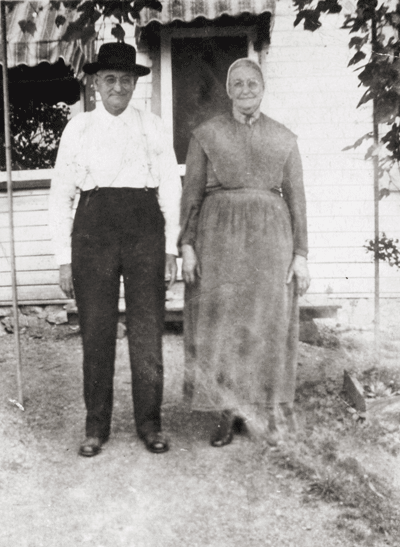 |
Paternal Grandparents |
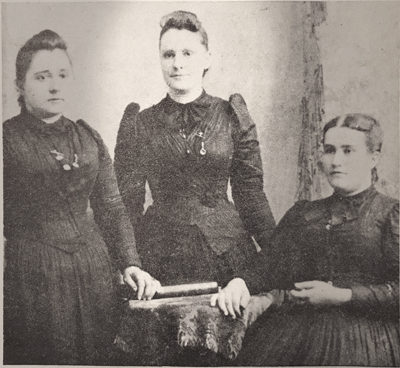 |
Maternal Grandmother, Rebecca Shank with sisters
|
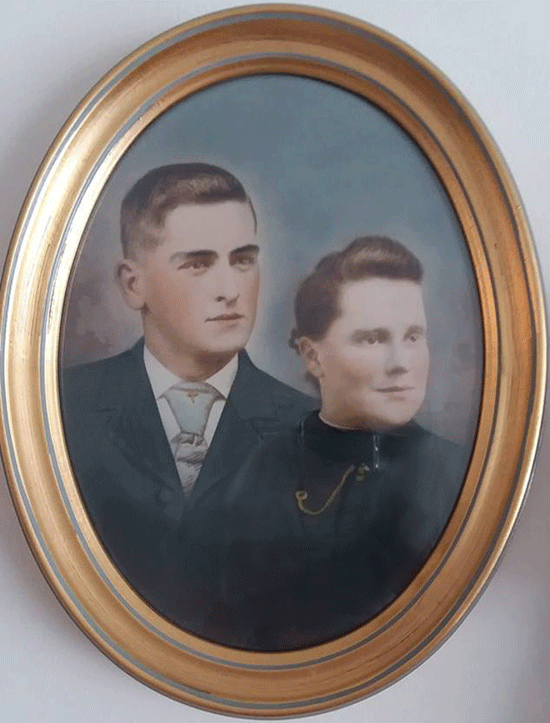 |
Maternal Grandparents (maybe a wedding picture) |
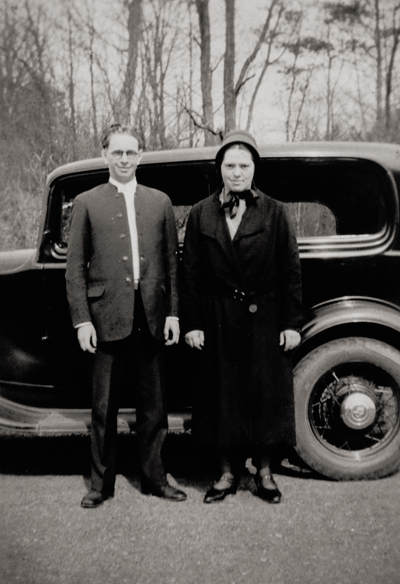 |
Daddy and Mother dating or "just married" |
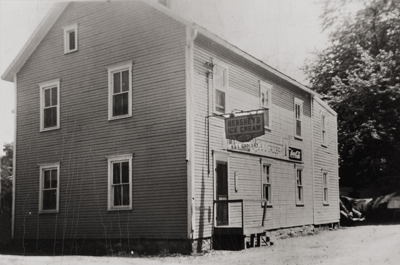 |
| First grocery store and upstairs apartment |
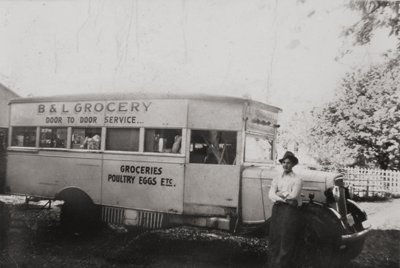 |
B & L Grocery store truck |
|





